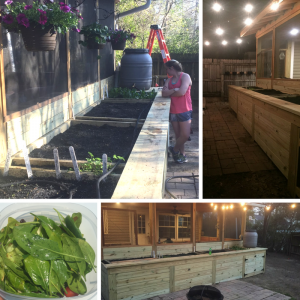Post contributed by Diana Rowell, Office of Sustainability Intern
Sustainability. That’s a big word. A word that carries the weight of worldwide change. A passionate word, a futuristic word, a word that makes people share their opinions. As an engineer, sometimes it is difficult to align myself with sustainability without my peers jumping to conclusions. However, when it comes down to it we all share the same goal. We want to make our world a better place to live for ourselves and for future generations.
We all have our own levels of commitment to sustainability, but it is important to find what obligation works best for your lifestyle. Before February of 2016, I had no idea what sustainability was, and much less about Auburn’s mission to become a more sustainable campus. It started when my friend introduced me to the Sustainability Studies minor, and through their email list I learned about the Office of Sustainability internships. The opportunity sounded great, and would definitely allow me to step out of my comfort zone! So I applied, went through the interview process, and was selected to be an intern for the following school year.
During my time with the Office of Sustainability, I have learned about several different ways to be more sustainable. Everyone in our office has different levels of personal commitment to sustainability. We all have a common goal of making the university more sustainable, but we each have our own way of doing it. For example, the interns who are design students think about how to make product design more sustainable, while other interns have switched to a vegetarian diet to help reduce their impact.

Diana’s garden not only provides delicious, nutritious food, but also enhances her outdoor space.
Not only have I learned how to become better at recycling, I’ve also become more aware of the relationship between my food choices and sustainability. Knowing where our food comes from and how it impacts our environment is very important to understanding the systems approach when learning about sustainable practices. The environmental impact of our food is astounding. We often don’t realize that most of the produce we consume is raised using industrial fertilizers that seep into our waterways and can cause problems to the water quality for marine life. After our food is grown, it travels hundreds and sometimes thousands of miles to get to our grocery stores. Sometimes when I read the stickers on my fruit, I’m surprised to see such faraway places, my food has been further from its home than I have!
Once I learned how far my food traveled to get to me, and how much waste goes into growing it, and what goes into the food I eat, I wanted to buy more locally grown items. Often these are more fresh, help to support local farmers, and don’t have as big a footprint as foods imported from big farms or faraway places. Food has a great impact on my life because I really enjoy cooking and feeding others. But what is better than eating local food? Growing your own!
I found little interest in learning about how to grow my own food until recently. I started with a little raised bed in my backyard, but my boyfriend soon decided to build bigger and better beds with an integrated rain barrel to help keep the beds watered. He helped me get started, and we soon had some spinach, lettuce, radishes, onions, and beets planted. We have started some tomato and cucumber seeds in trays inside, and plan to plant them when the weather gets a little warmer. I find myself spending more time outside in my backyard since I’ve decided to try out gardening. I often want to check on the plants, see how much they’ve grown, and if they need water. I made a salad using the spinach that was grown in the garden for dinner a few nights ago, and it was really rewarding knowing I had grown something I could eat instead of buying it from the store. Hopefully, this summer will be even more successful, and my example can convince others to try out gardening once I show them how successful my garden has been!
Everything I have learned about sustainability in the past year has really helped me make this lifestyle choice to grow my own food. Of course, my living circumstances allowed me to make this choice (I have a yard), but it is important to find what matters to you and what sustainable choices can fit your lifestyle. Maybe it is trying to have “Meatless Mondays,” choosing to walk to reach your destinations, or learning how to use your local recycling center. A year ago, I would have never been excited about gardening or sustainability, but now I know it’s my responsibility to society to find sustainability commitments that work for my lifestyle, so we can all live in a better place and pass a better world to future generations.




